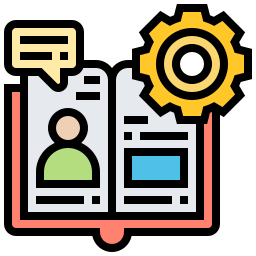The business world has always had to adapt to market demands, customer timelines, and the pace of the planet. Over 30 years ago, it was discovered that system fragmentation between departments and areas of the same company was a widespread obstacle in businesses. This led to the development of Enterprise Resource Planning (ERP) software.
ERPs emerged as an integrated solution to centralize and unify various functions within areas such as finance, inventory, purchasing, sales, production, and human resources, among others. Over the years, they have evolved with different interfaces, features, and customer services.
What's an ERP?
An ERP is an integrated software system that allows you to manage and automate various processes within your company in one place. From inventory management and accounting to sales and customer service, an ERP centralizes and optimizes your organization's operations. In short, it is a brain that coordinates and synchronizes all your business activities.
How does an ERP work?

The functioning of an ERP is based on real-time data collection, storage, and processing. Through a centralized database, it enables different departments and functions of your organization to share information and work together.
This is achieved through:
Process integration: The ERP integrates and centralizes your key business processes such as inventory management, accounting, production, sales, marketing, purchasing, and human resources, among others. This means that data and information are shared and updated in real-time, avoiding duplication and coordination issues between different departments of your company.
Centralized database: The ERP uses a centralized database to store and manage all data related to your organization. This allows you to quickly and securely access updated information, facilitating decision-making and generating accurate reports.
Process automation: In an ERP, you can automate repetitive tasks and processes, which helps reduce errors and save time. You can automate the generation of financial reports, invoice issuance, email marketing management, inventory management, and order tracking, among others.
Workflow and collaboration: In an ERP, you can establish workflows and collaboration rules that enable better coordination and communication among employees. This facilitates task assignment, process approval, and collaboration on projects.
Analysis and reporting: With an ERP, you have analysis and reporting tools that allow you to gain deep insights and make data-driven decisions. You can generate custom reports, perform trend analysis, measure performance, and evaluate process efficiency.
Which is the best ERP?

Choosing the best software for managing your company is a challenging task, especially if you are unsure about what factors to consider when making your decision. There are different providers offering different solutions and possibilities, but we want to share with you 6 steps to follow when selecting the best ERP.
Identify: Determine which processes you need to automate, which data you need to analyze, and which functions you need to efficiently perform your work. By identifying your needs, you can determine what features are important in an ERP.
Compare: Make sure to compare the features offered by different ERP providers. Some important features may include inventory management, purchase order tracking, supply chain management, financial management, and project management. Also, ensure that the software can integrate with other systems you already use.
Evaluate usability: Any change in your processes generates a learning curve. Evaluate the user interface, customization options, and report generation capabilities.
Consult with experts: If you are unsure about which ERP is suitable for your company, consult with business consultants, software providers, or IT experts.
Look for a scalable solution: It's important to choose an ERP that can grow with your company. Make sure the software can handle increasing data volume and can adapt to your needs as your company grows and evolves.
Consider long-term costs: Investing in an ERP that helps streamline your processes will help reduce production costs.
When it comes to ERP systems, Odoo stands out as an undisputed leader. With its modular and highly customizable approach, combined with the right partner, it adapts to the specific needs of your company, whether small, medium, or large. Its wide range of integrated applications covers all key areas of your business, from inventory management and accounting to e-commerce and marketing. Odoo distinguishes itself with its intuitive usability, modern interface, and ability to scale according to ever-evolving business needs.
If you're considering implementing Odoo in your company, Vauxoo is your strategic ally. We have been recognized as the best Odoo partner in Latin America on three occasions, thanks to our deep knowledge of the ERP, which allows us to adapt it to companies of any industry, size, and location.
Four advantages of choosing Odoo and Vauxoo, your ideal combination:

Customized implementation: At Vauxoo, we understand that your company is unique and has specific requirements. We will work closely with you to customize the implementation of Odoo according to your needs and business goals.
Specialized technical support: At Vauxoo, we have a team of highly trained technical professionals who are ready to answer your questions, solve problems, and provide necessary support at any time.
Continuous updates: Odoo is constantly evolving and improving. At Vauxoo, we stay up-to-date with the latest updates and new features, ensuring that you always use the most advanced and efficient version of the system.
Training and education: At Vauxoo, we provide you with the necessary training to maximize the use of Odoo in your company. From initial training to ongoing training, you will be equipped with the knowledge and skills needed to make the most of your ERP. Additionally, we share our expertise on social media platforms such as YouTube, LinkedIn, Github, Facebook, TikTok, and Instagram.
Youtube, LinkedIn, Github, Twitter, Facebook, TikTok e Instagram.
The investment in enterprise software worldwide has been steadily growing since 2010. In 2022, global spending reached 783 billion dollars with the main investment options being Business Process Management (BPM) software, Enterprise Resource Planning (ERP) software, and Customer Relationship Management (CRM) software.
Having an ERP not only helps alleviate pain points within your company, improve efficiency, and leverage your team's capabilities, but it is also necessary to address global trends indicating that using ERPs is essential to remain a strong competitor in the market.